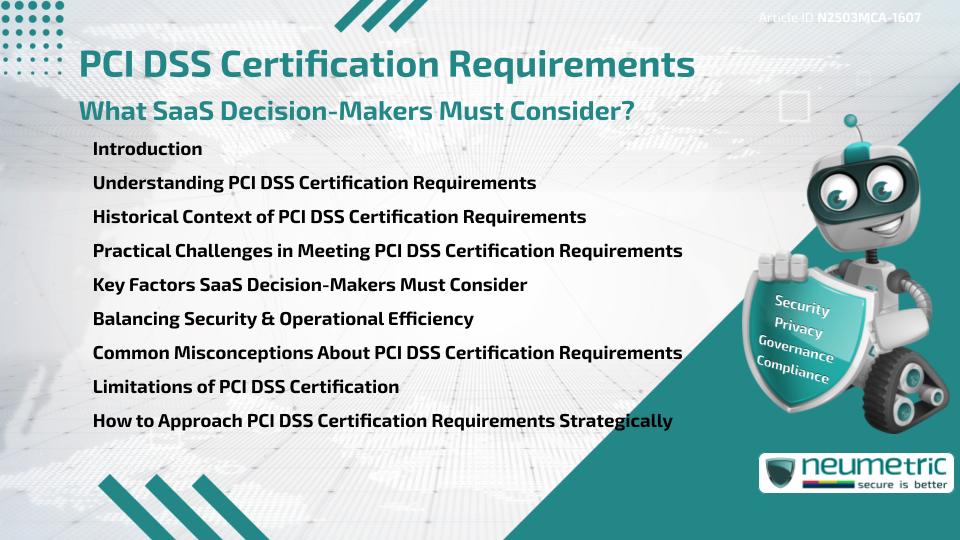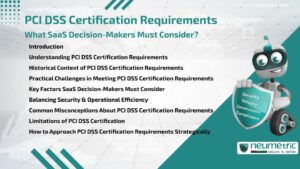Table of Contents
ToggleIntroduction
In the rapidly growing world of Software-as-a-Service [SaaS], security is no longer just a technical necessity. It has become a strategic advantage. One major Framework that shapes how SaaS companies handle payment data is the Payment Card Industry Data Security Standard [PCI DSS]. Understanding PCI DSS certification requirements is crucial for SaaS decision-makers aiming to earn Customer Trust & stay compliant. This article breaks down what decision-makers must know, while offering clear insights into challenges, considerations & strategies.
Understanding PCI DSS Certification Requirements
PCI DSS certification requirements are a set of security standards created to protect cardholder data. These standards apply to any business that stores, processes or transmits cardholder information. For SaaS businesses, Compliance is essential if their services involve handling any type of payment data, either directly or indirectly.
At its core, PCI DSS certification requirements aim to ensure that strong Security Controls are in place. These controls include secure network configurations, encryption practices, Access Controls & monitoring systems. Missing even one requirement can jeopardize not just certification but also the trust customers place in a platform.
Historical Context of PCI DSS Certification Requirements
The early 2000s saw a rise in digital transactions and, with it, a surge in data breaches. Major credit card companies like Visa, MasterCard, American Express, Discover & JCB collaborated to create a unified Standard to counteract these Threats. Thus, PCI DSS was born in 2004.
Initially, PCI DSS certification requirements were viewed mainly as guidelines. However, growing Cybersecurity Threats soon pushed industries toward stricter enforcement. Today, PCI DSS certification requirements serve as a mandatory baseline for any company dealing with payment information.
Practical Challenges in Meeting PCI DSS Certification Requirements
Achieving Compliance is not as simple as checking boxes. SaaS businesses often face real-world hurdles like evolving infrastructure, Third Party integrations & dynamic User environments.
For instance, shared cloud services can complicate ownership of Compliance responsibilities. One department might encrypt data while another may accidentally weaken controls through poor configuration. Such complexities make meeting PCI DSS certification requirements an ongoing process rather than a one-time achievement.
An analogy would be maintaining a clean house: cleaning once is not enough. Daily effort is required to keep it secure & tidy.
Key Factors SaaS Decision-Makers Must Consider
When approaching PCI DSS certification requirements, SaaS leaders must focus on:
- Scope Definition: Know exactly which systems & processes are in scope. Poor scoping often leads to unnecessary complexity.
- Vendor Management: If you rely on Third Party vendors, their Compliance matters too.
- Staff Training: Human error remains one of the largest Risks in Data Security.
- Regular Monitoring & Testing: Continuous Monitoring & regular Penetration Testing are vital for sustained Compliance.
- Cost vs Benefit: Balancing the costs of Compliance with the benefits it brings to business reputation & Customer Trust.
Ignoring these factors may lead to painful remediation efforts later.
Balancing Security & Operational Efficiency
One misconception about PCI DSS certification requirements is that they hinder business agility. However, when approached strategically, security & efficiency can coexist.
Think of it like building a well-constructed bridge. A strong structure (security) enables more vehicles (Business Operations) to move safely & quickly. Similarly, embedding PCI DSS practices early into SaaS operations ensures smooth & scalable growth without last-minute scrambles.
Common Misconceptions About PCI DSS Certification Requirements
Several myths cloud judgment around PCI DSS certification requirements:
- “Only Large Companies Need Certification”: Any company, regardless of size, that handles card data must comply.
- “Outsourcing Means No Responsibility”: Even if you outsource payment processing, you are still responsible for ensuring Third Party Compliance.
- “Compliance Equals Security”: Being compliant does not guarantee you are invulnerable. It just means you meet minimum baseline security standards.
Understanding these myths helps decision-makers plan better & avoid costly mistakes.
Limitations of PCI DSS Certification
While PCI DSS certification requirements offer robust security guidelines, they have their limits. For one, the Framework does not address newer payment models like cryptocurrency transactions comprehensively. Also, the Standard tends to be reactive rather than proactive, updating only after significant incidents highlight Vulnerabilities.
SaaS businesses must therefore treat PCI DSS certification requirements as the foundation, not the ceiling, of their security posture.
How to Approach PCI DSS Certification Requirements Strategically
A strategic approach involves:
- Early Integration: Embed PCI DSS practices into product design & development phases.
- Cross-Department Collaboration: Make sure engineering, operations, sales & Customer support all understand their roles.
- External Audit Readiness: Conduct mock audits to identify & fix gaps early.
By treating PCI DSS certification requirements as part of the company culture, SaaS Providers can turn Compliance from a burden into a competitive advantage.
Conclusion
PCI DSS certification requirements are far more than just regulatory hurdles for SaaS companies. They represent a structured path toward creating trust, ensuring security & maintaining competitiveness. By understanding historical context, addressing challenges & adopting a strategic mindset, decision-makers can navigate PCI DSS certification requirements with greater confidence & success.
Takeaways
- PCI DSS certification requirements are mandatory for any SaaS business handling payment data.
- Practical challenges exist but can be managed with careful planning & execution.
- Balancing security with operational efficiency is not only possible but essential.
- Misconceptions must be cleared to avoid Compliance pitfalls.
- PCI DSS certification is a foundation, not a full security guarantee.
FAQ
What are PCI DSS certification requirements?
PCI DSS certification requirements are a set of security standards that businesses must follow to protect cardholder data when storing, processing or transmitting it.
Do small SaaS companies need to meet PCI DSS certification requirements?
Yes, any SaaS company that handles cardholder data, regardless of size, must comply with PCI DSS certification requirements.
How often should SaaS companies review their PCI DSS certification requirements?
SaaS companies should conduct internal reviews at least once a year & whenever major changes are made to their systems or processes.
Does outsourcing payment processing remove PCI DSS certification responsibilities?
No, companies remain responsible for ensuring that any Third Party providers they use are also PCI DSS compliant.
Is being PCI DSS compliant the same as being fully secure?
No, PCI DSS certification requirements offer a minimum standard. Businesses should implement additional measures to enhance security.
What happens if a SaaS company does not meet PCI DSS certification requirements?
Failure to comply can lead to penalties, fines & loss of Customer Trust, which can severely damage the business.
Can PCI DSS certification requirements be integrated into SaaS development?
Yes, by adopting a secure development lifecycle, SaaS companies can embed PCI DSS certification requirements from the start.
Are there any exemptions from PCI DSS certification requirements?
Some companies may qualify for simplified validation methods based on the volume of transactions but they are still required to comply.
Need help?
Neumetric provides organisations the necessary help to achieve their Cybersecurity, Compliance, Governance, Privacy, Certifications & Pentesting goals.
Organisations & Businesses, specifically those which provide SaaS & AI Solutions, usually need a Cybersecurity Partner for meeting & maintaining the ongoing Security & Privacy needs & requirements of their Clients & Customers.
SOC 2, ISO 27001, ISO 42001, NIST, HIPAA, HECVAT, EU GDPR are some of the Frameworks that are served by Fusion – a centralised, automated, AI-enabled SaaS Solution created & managed by Neumetric.
Reach out to us!





